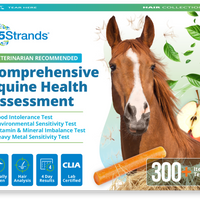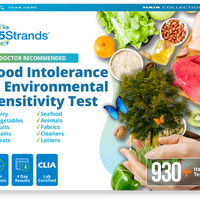Human food intolerance testing is increasingly commonplace, with an estimated 1 in 7 people in the developed world – up to 15% of the world population – suffering from some form of food intolerance. Food intolerances are caused by the body's inability to digest a particular food component. This can be due to a lack of enzymes needed for digestion or simply an imbalance in natural probiotics, leading to unstable gut health and our body’s inability to absorb the necessary nutrients in the food required to keep us biologically balanced and healthy.
Many foods can cause intolerances, but some of the most common include:
DairyGlutenCornSoyEggsNuts
While there is no cure for food intolerances, they are not as severe or life-threatening as allergy reactions. The good news is that these food intolerances can be tested, identified, and managed, allowing us to live long and healthy lives. The best way to manage our food intolerances is to test and identify them, avoid the trigger foods, and focus on eating a healthy and balanced diet. Once these triggers are identified, making informed and confident health decisions will be much easier. With the right approach, anyone can successfully manage their food intolerances and enjoy better health and well-being.
Common Food Intolerances
If you have a food intolerance, you are not alone. Many people worldwide find that certain food items make them feel unwell afterward. The best way to handle this is to identify what foods are causing your reactions and avoid them or consume them in small amounts. By identifying which food(s) makes you feel unwell and adjusting accordingly, you can better manage your food intolerance(s).
Navigating food intolerances can be tricky and complicated, but it's essential when looking after oneself. Some of the more common food intolerances you may recognize include lactose intolerance or gluten intolerance. Lactose intolerance is the most common food intolerance, and it is estimated that up to 75% of the world's population is affected by it. Many people suffer from lactose intolerance without even knowing it.
Beyond these, better-known intolerances, like lactose and gluten, there are less common food intolerances. These include dairy products, seafood, shellfish, food additives such as sulfites or tartrazine, nightshades such as potatoes and tomatoes, eggs, and sugar alcohols such as sorbitol and xylitol. There are many different ways to manage your food intolerances, but the best way for you will be based on your intolerance test results.
While food allergies are sometimes easier to identify, food intolerances may not present as clinically and may require food diaries or dietary changes to observe symptoms.
Food Intolerance vs. Immune System Reaction
Eating food can be tricky if you have food allergies or food intolerances. Food intolerance is an often misunderstood affliction that does not involve the body's immune system. It is usually caused by a food's physical or vitamin and mineral chemical makeup rather than its allergic components. Food allergies are abnormal responses to food induced by the immune system. These reactions occur almost immediately and can range in severity from mild rashes to deadly anaphylaxis.
Both food allergies and food intolerances can result in unpleasant and sometimes severe symptoms, making trying new foods stressful for those with either condition. For those with food allergies or food intolerances, learning to recognize the signs of different food intolerances can help identify the symptoms’ root causes.
Digestive Enzymes and Probiotics
Awareness of your food intolerances and general health and wellness is integral to health. Food intolerances can seem mysterious, but the underlying cause often comes down to enzymes or specific food components. In some cases, food intolerance tests can be caused by chemicals in food that irritates the body in different ways, leading to such issues as bloating, brain fog, and digestive changes. When food is consumed, it needs to be broken down into its nutrients to be absorbed by our body. This is where digestive enzymes and probiotics, living microorganisms known as biological polymers, come in: they help break down critical food nutrient components such as proteins, carbohydrates, and lipids.
Food Intolerance Testing and Discovery
The focus of elimination diets is to identify potential food triggers by removing them from regular consumption and observing the positive or negative changes that follow to gain insight into healthier food choices.
Elimination diets are a food-based method of assessing food intolerance involving removing certain food substances, like dairy, gluten, corn, soy, eggs, and nuts. These categorizations represent food intolerances – additives and those that naturally occur in food and can cause noticeable reactions – and artificial ingredients that may have inflammatory or toxic effects.
Good to Know
Flavor additives like monosodium glutamate (MSG), colorings, and preservatives also figure prominently in this equation. While still heavily debated among experts across the U.S. Food and Drug Administration (FDA), these artificially produced ingredients are thought to contribute to food sensitivity despite being ostensibly safe for human consumption.

Some of the more common bodily symptoms experienced after consuming potential food intolerance triggers are:
BloatingFlush skinRashesFatigueRunny NoseRefluxHeadachesAbdominal PainsDiarrhea
It’s essential to note ingredients consumed if any food intolerance symptoms occur during a meal. We recommend keeping a 30-day journal of your meals consumed, including the dates and times these meals were consumed. This will aid you in identifying the frequency with which you consume foods and ingredients that you suspect might be linked to your food sensitivity or food intolerance(s).
Relieve Your Ongoing Symptoms With Supplements
While food intolerances can generally be managed by changing one's diet, many people have found that supplementing with a good amount of natural digestive enzymes and probiotics helps them process food more effectively.
The U.S. Department of Health and Human Sciences and the National Library of Medicine has long researched the benefits of enzyme and probiotic supplements. Even nutrient deficiencies - like iron - can also contribute to food intolerance, so smart supplementation can ensure you receive adequate nutrients for optimal health and effective management of food intolerance symptoms.
The supplementation of digestive enzymes has been known to help with food intolerances when the intestines cannot produce the necessary enzymes themselves. For those suffering from food intolerances, supplementation is commonly seen as a potential relief route.
Managing Your Food Intolerance and Mental Health
None of us like the word “diet.” Instead of that dirty word, imagine instead saying “food choices.” Eating food that agrees with your body can help keep your digestion running smoothly.
Eating the right food is essential for digestion. Instead of consuming sugary treats or convenient pre-packaged meals, choose healthier alternatives such as whole grains, fresh fruits and vegetables, and lean meats. By cutting down on unhealthy foods, your body can better handle digestion.
Eating with food intolerances can feel like a daunting challenge. However, there are ways to make food choices that will respect your food sensitivities while providing delicious and nutritious meals. Choosing natural foods and avoiding anything highly processed or refined is essential to maintaining a healthy diet without triggering food intolerances. Whole grains such as bran-rich oatmeal and quinoa provide more fiber than bleached white flour and help keep feelings of bloating at bay. Also, swapping out roast beef for grilled chicken or salmon can be a healthy option as these leaner proteins don’t contain the same difficult-to-digest substances sometimes found in processed meats.
Good News
Taking the time to consider food sensitivities and make food choices with those in mind is an increasingly important part of health and wellness. We can all benefit from making better food choices that give us more nutrition and fewer food intolerance symptoms. A 2021 Harvard Medical School study revealed that healthy foods are linked to better brain power:
- Green, leafy vegetables are dense in vitamin K, lutein, folate, and beta-carotene, helping slow cognitive decline.
- Fatty fish are good sources of omega-3 fatty acids linked to lower blood levels of beta-amyloid, reducing the risk of Alzheimer's disease.
- Berries contain flavonoids and plant pigments which are linked to improving memory.
- Tea and coffee boost better short-term concentration and help solidify new memories.
Nourishment isn't a one-size-fits-all adventure—we all have different needs, and those food allergies we want to avoid often require extra care in our food selection processes. But even small steps that involve being mindful of food intolerance triggers can lead to more significant relief. So take the time to explore nutrient-dense food options.
In addition to our research for your benefit, we hope you consider completing a food intolerance test. Once you have done this, you can confidently move forward in your journey to better wellness and health. Many Dietitians and Nutritional health professionals can assist you in building a healthy and disciplined diet based on your food intolerance findings so that you can be consistent, motivated, and confident on your journey to a healthier you!



























